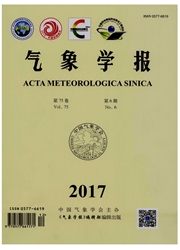

 中文摘要:
中文摘要:
基于中国台站降水和温度观测资料、中国气象局国家气候中心月动力延伸预报的回算和预测结果讨论了中国区域月平均温度和降水模式可预报性的时空变化特征。文中以持续性预报来表征中国区域月平均温度和降水受外强迫影响下的可预报性,持续性预报技巧存在明显的年际和年代际变化特征;春末夏初和秋季预报评分相对偏低;在中国区域气候变暖和平均降水强度极值增加的背景下,温度的持续性预报评分有明显提高,降水的持续性预报略有下降。月动力延伸预报对月降水和温度的预报能力也存在明显的年际和年代际变化特征;与持续性预报相比,月动力延伸温度预报总体优于持续性预报,降水预报在初春略差,温度预报在8月相对最低。近20余年,月动力延伸预报相对于持续性预报的温度和降水的均方根误差技巧均大于零,其年际变化表现为模式对降水的预测略有提高。两种预报评估结果的空间分布分析表明月动力延伸预报达到显著性水平的正相关区域总体上比持续性预报的范围大,并基本涵盖了持续性预报的高相关区。原因是可预测信息部分来源于外强迫异常的影响,部分来源于对大气内部动力过程的模拟。
 英文摘要:
英文摘要:
The predictability of monthly mean temperature and precipitation over China was spatially/temporally analyzed by using the 160 station monthly temperature and rainfall observation data from 1951 to 2005 and the hindcast experiment products of Dynamical Extended Range Forecast of National Climate Center (DERF/NCC) from 1982 to 2005. The persistence forecast was used as a reference in order to assess the skill of the DERF of monthly temperature and precipitation. The skill of the persistence forecast of monthly temperature and precipitation has clear interannual and decadal variations: low skills occurred in the end of spring, the beginning of summer, and autumn. Under the background of climate warming and average rainfall rate increasing, the skill of monthly temperature persistence forecast has significantly improved whereas that of monthly precipitation persistence forecast has slightly decreased since 1982. The DERF/NCC of monthly temperature and precipitation also showed similar interannual and decadal variation characters, but the skill of the DERF/NCC was higher than that of the persistent forecast. The precipitation/temperature predictability of DERF/NCC was low in early spring/August, respectively. The annual root mean square skill scores (RMSSS) of the DERF/NCC relative to persistence forecast for monthly temperature and precipitation were greater than zero which suggests that the DERF/NCC has higher skill than the persistent forecast. At the same time, the interannual variation of precipitation RMSSS indicated a relative improvement in the skill of DERF/NCC. The assessment of spatial distributions of the DERF/NCC and persistent forecast of monthly temperature and precipitation showed that the skill of DERF/NCC is generally higher than that of persistent forecast because the DERF/NCC combined the predictable information both from the external forcing (persistence forecast) and atmospheric interior dynamic processes. The areas where forecast reached the significant test level by the DERF/NCC
 同期刊论文项目
同期刊论文项目
 同项目期刊论文
同项目期刊论文
 期刊信息
期刊信息
